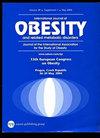英国 2019 年大选中的政治投票与全国代表性样本中肥胖症患者的生活风险。
IF 4.2
2区 医学
Q1 ENDOCRINOLOGY & METABOLISM
引用次数: 0
摘要
背景:来自美国的有限证据表明,县/州的肥胖人口比例与投票支持共和党总统候选人呈正相关,但这一问题尚未在美国以外的国家进行个人层面的研究,因为其他国家的卫生和政治制度与美国截然不同:利用个人层面的数据,评估英国 2019 年大选中肥胖症患者比例与政治投票的差异,并研究生活在由保守党议员赢得的选区中的人是否比生活在由其他党派议员赢得的选区中的人更有可能患有肥胖症:数据由益普索知识小组(Ipsos KnowledgePanel)获得,小组成员是通过随机概率非聚类地址抽样方法招募的。结果:2668/4000(67%)名受邀者提供了数据,95/2668(3.5%)名受邀者没有投票资格,其余 2573(96.5%)名受邀者提供了数据。保守党选民比工党选民(OR:1.42 95% CI (1.01-1.99))或自由民主党选民(1.54 95% CI (1.00-2.37))更有可能患有肥胖症。保守党选民的体重指数平均值明显高于工党和自由民主党选民;保守党选民与工党选民的体重指数平均值相差 0.88 点(95% CI:0.16-1.61),保守党选民与自由民主党选民的体重指数平均值相差 1.04 点(95% CI:0.07-2.02)。没有证据表明,生活在保守党议员赢得的选区中的参与者比生活在其他党派议员赢得的选区中的参与者更有可能患有肥胖症:结论:政府和公共卫生机构在制定减少肥胖症患者人数的策略时,可能需要关注公众的政治派别。本文章由计算机程序翻译,如有差异,请以英文原文为准。
Political voting in the United Kingdom 2019 general election and risk of living with obesity in a nationally representative sample
Limited evidence from the United States suggests that county/state rates of people with obesity are positively associated with voting for the Republican Party presidential candidate, although this question has not yet been studied at the individual level, and/or outside of the United States, where the health and political systems are very different in other countries. Using individual level data, assess differences in rates of people with obesity according to political voting in the United Kingdom 2019 general election, and examine whether people living in constituencies won by Members of Parliament (MPs) from the Conservative Party were more likely to be living with obesity than those living in constituencies won by MPs from other parties. Data was obtained by the Ipsos KnowledgePanel where panellists are recruited via a random probability unclustered address-based sampling method. 4000/14,016 panellists were randomly invited to provide data on socio-demographics, health outcomes, voting behaviour and height/weight. 2668/4000 (67%) of invitees provided data, 95/2668 (3.5%) were not eligible to vote, with the remaining 2573 (96.5%) included. Conservative Party voters were more likely to be living with obesity than those who voted Labour (OR:1.42 95% CI (1.01–1.99)) or Liberal Democrats (1.54 95% CI (1.00–2.37)). Conservative Party voters on average had significantly higher BMI scores than those voting Labour and Liberal Democrats; BMI mean difference 0.88 points (95% CI: 0.16–1.61) between Conservative and Labour voters, and 1.04 points (95% CI: 0.07–2.02) between Conservatives and Liberal Democrats voters. There was no evidence participants living in constituencies won by Conservative MPs were more likely to be living with obesity than constituencies won by other party MPs. Governments and public health agencies may need to focus on the political affiliation of the public when developing strategies to reduce the number of people with obesity.
求助全文
通过发布文献求助,成功后即可免费获取论文全文。
去求助
来源期刊

International Journal of Obesity
医学-内分泌学与代谢
CiteScore
10.00
自引率
2.00%
发文量
221
审稿时长
3 months
期刊介绍:
The International Journal of Obesity is a multi-disciplinary forum for research describing basic, clinical and applied studies in biochemistry, physiology, genetics and nutrition, molecular, metabolic, psychological and epidemiological aspects of obesity and related disorders.
We publish a range of content types including original research articles, technical reports, reviews, correspondence and brief communications that elaborate on significant advances in the field and cover topical issues.
 求助内容:
求助内容: 应助结果提醒方式:
应助结果提醒方式:


